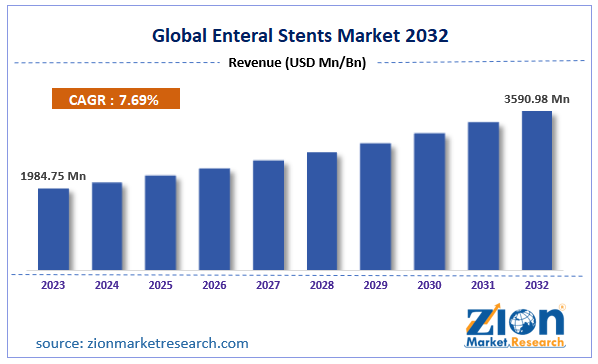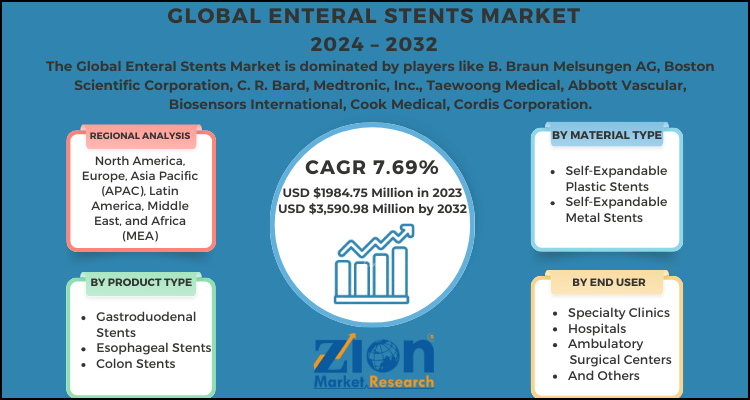Enteral Stents Market Size, Share, Industry Analysis, Trends, Growth, 2032

Enteral Stents Market By Product type (gastroduodenal stents, esophageal stents, and colon stents), By Material Type (self-expandable plastic stents and self-expandable metal stents), By end user (specialty clinics, hospitals, ambulatory surgical centers, and others.), By Region (Asia-Pacific, North America, Europe, South America, and the Middle East and Africa) - Global And Regional Industry Overview, Market Intelligence, Comprehensive Analysis, Historical Data, And Forecasts 2024 - 2032-
| Market Size in 2023 | Market Forecast in 2032 | CAGR (in %) | Base Year |
|---|---|---|---|
| USD 1984.75 Million | USD 3,590.98 Million | 7.69% | 2023 |
Description
Enteral Stents Industry Prospective:
The global enteral stents market size was worth around USD 1984.75 Million in 2023 and is predicted to grow to around USD 3,590.98 Million by 2032 with a compound annual growth rate (CAGR) of roughly 7.69% between 2024 and 2032.
The report analyzes the global enteral stents market drivers, restraints/challenges, and the effect they have on the demands during the projection period. In addition, the report explores emerging opportunities in the enteral stents industry.
Global Enteral Stents Market: Overview
Enteral stents are deployed in the colon, stomach, and small bowel. The malignant luminal obstruction of the gastrointestinal tract is treated by the enteral stents. Not only the enteral stents be used for palliation of malignant obstruction but also they can be used within the colon as a pre-operative modality. Enteral stents retain the lumen of the vessels, hollow organs, and ducts. For colonic stents, the pre-operative stenting permits a one-stage operation and avoids a colostomy. The surgery can be avoided in patients who are undergoing palliation of obstruction with the help of self-expandable metal stents.
Global Enteral Stents Market: Growth Factors
The factors that are driving the enteral stents market are the increasing use of stents in non-malignant applications, the rise in the need for effective therapies that will reduce the risk of complications, the increasing use of removable and fully-covered metal stents in gastrointestinal applications, the technological advancements that are made in the stent technology with regards to delivery systems and stent design, increasing inclination towards the use of minimally-invasive techniques, and the increasing awareness among the patients are some of the factors that are driving the growth of enteral stents market. However, there are some unmet needs related to the products that are hampering the growth of the enteral stents market.
Global Enteral Stents Market: Report Scope
| Report Attributes | Report Details |
|---|---|
| Report Name | Enteral Stents Market Research Report |
| Market Size in 2023 | USD 1984.75 Million |
| Market Forecast in 2032 | USD 3,590.98 Million |
| Growth Rate | CAGR of 7.69% |
| Number of Pages | 255 |
| Forecast Units | Value (USD Billion), and Volume (Units) |
| Key Companies Covered | B. Braun Melsungen AG, Boston Scientific Corporation, C. R. Bard, Medtronic, Inc., Taewoong Medical, Abbott Vascular, Biosensors International, Cook Medical, Cordis Corporation, Stryker Corporation, and Terumo Corporation, and others. |
| Segments Covered | By Product Type, By Material Type, By End-User, And By Region |
| Regions Covered | North America, Europe, Asia Pacific (APAC), Latin America, Middle East and Africa (MEA) |
| Base Year | 2023 |
| Historical Year | 2018 to 2022 |
| Forecast Year | 2024 - 2032 |
| Customization Scope | Avail customized purchase options to meet your exact research needs. Request For Customization |
Enteral Stents Market: Restraints
The enteral stents market faces various barriers to medical adoption. Stent migration, perforation, and tissue overgrowth are major drawbacks of enteral stents. These problems compromise stent implantation safety and efficacy. Infection risk, especially long-term, may dissuade healthcare providers from prescribing or using enteral stents. A lack of competent healthcare workers who can insert and manage enteral stents can potentially limit market growth.
The expense of various equipment and procedures may limit accessibility, especially in resource-constrained healthcare settings. Product introductions and market entry are delayed by regulatory issues and strict approval processes for new enteral stent products. Enteral stent adoption is affected by the dynamic nature of underlying medical disorders including gastrointestinal blockages, which create long-term concerns. Product safety improvements, medical training, and regulatory streamlining for enteral stent advances are needed to overcome these constraints.
Enteral Stents Market: Opportunities
The enteral stents market is promising due to technological advances and changing healthcare needs. Novel materials and designs that improve enteral stent safety and performance can reduce migration and tissue overgrowth. Bioresorbable stent innovations could transform the industry by providing temporary support and reducing secondary removal. As the population ages, gastrointestinal tumors and strictures require enteral stent insertion more often.
This demographic trend makes enteral stents essential for palliative treatment and symptom management. Stent placement with enhanced imaging and endoscopic assistance improves precision and decreases problems. Medical device makers and healthcare organizations can collaborate on enteral stent research and development to create patient-specific solutions. Enteral stents offer practical alternatives to hospital-based procedures as ambulatory surgical centers and outpatient care settings grow. Technological advances, demographic trends, and strategic partnerships that improve the accessibility and efficacy of enteral stents will boost the market.
Global Enteral Stents Market: Segmentation
The global market for enteral stents is fragmented into product type, material type, and end user.
Based on the product type, the global market is segregated into gastroduodenal stents, esophageal stents, and colon stents.
Based on the material type, the market is categorized into self-expandable plastic stents and self-expandable metal stents.
Based on the end user, the market is bifurcated into specialty clinics, hospitals, ambulatory surgical centers, and others.
Global Enteral Stents Market: Regional Analysis
Regional diversification of the enteral stents market is given as follows Latin America, the Middle East & Africa, Western Europe, Eastern Europe, North America, and Asia Pacific. Currently, North America is dominating the enteral stents market. The factors that are contributing to the market growth in the North American region are increasing cases of cancer, technological advancement, changing lifestyles, and fast adoption of early treatment. The second place in the enteral stents market is held by Europe.
In the coming years, the Asia Pacific region will have rapid market growth. Factors that are supporting the market growth in the Asia Pacific region are increasing growth in the population, advancements in the healthcare infrastructure, increasing per capita expenditure and increasing research and development. The market will have increasing opportunities in Latin America and the Middle East & Africa regions owing to increasing consumption of alcohol, increasing investment by key manufacturers, health care insurance coverage by private and government firms, and growing awareness among people.
Global Enteral Stents Market: Competitive Players
The key market players that are involved in the enteral stents market include
- B. Braun Melsungen AG
- Boston Scientific Corporation
- C. R. Bard, Medtronic. Inc.
- Taewoong Medical
- Abbott Vascular
- Biosensors International
- Cook Medical
- Cordis Corporation
- Stryker Corporation
- Terumo Corporation
- And Others
The global enteral stents market is segmented as follows:
By Product Type
- Gastroduodenal Stents
- Esophageal Stents
- Colon Stents
By Material Type
- Self-Expandable Plastic Stents
- Self-Expandable Metal Stents
By End User
- Specialty Clinics
- Hospitals
- Ambulatory Surgical Centers
- And Others
Global Enteral Stents Market: Regional Segment Analysis
- North America
- U.S.
- Europe
- UK
- France
- Germany
- Asia Pacific
- China
- Japan
- India
- Latin America
- Brazil
- The Middle East and Africa
What Reports Provide
- Full in-depth analysis of the parent market
- Important changes in market dynamics
- Segmentation details of the market
- Former, ongoing, and projected market analysis in terms of volume and value
- Assessment of niche industry developments
- Market share analysis
- Key strategies of major players
- Emerging segments and regional markets
- Testimonials to companies in order to fortify their foothold in the market.
Table Of Content
FrequentlyAsked Questions
Enteral stents sustain and maintain gastrointestinal tract hollow structures. Enteral stents are implanted endoscopically to relieve obstructions and restore fluid and nutrition flow in circumstances caused by tumors or inflammatory illnesses. These stents are constructed of metal or silicone and can be balloon- or self-expanding. Enteral stents are a less intrusive and faster recovery option than surgery. These gadgets aid palliative care, symptom management, and quality of life for gastrointestinal patients.
The factors that are driving the enteral stents market are the increasing use of stents in the non-malignant applications.
According to a study, the global enteral stents industry size was $1984.75 million in 2023 and is projected to reach $3,590.98 million by the end of 2032.
The global enteral stents market is anticipated to record a CAGR of nearly 7.69% from 2024 to 2032.
North America is dominating the enteral stents market. The factors that are contributing to the market growth in the North American region are increasing cases of cancer, technological advancement, changing lifestyles, and fast adoption of early treatment.
The key market players that are involved in the enteral stents market include B. Braun Melsungen AG, Boston Scientific Corporation, C. R. Bard, Medtronic, Inc., Taewoong Medical, Abbott Vascular, Biosensors International, Cook Medical, Cordis Corporation, Stryker Corporation, and Terumo Corporation.
The global enteral stents market report covers the geographical market along with a comprehensive competitive landscape analysis. It also includes cash flow analysis, profit ratio analysis, market basket analysis, market attractiveness analysis, sentiment analysis, PESTEL analysis, trend analysis, SWOT analysis, trade area analysis, demand & supply analysis, Porter’s five force analysis, and value chain analysis.
HappyClients
Zion Market Research
Tel: +1 (302) 444-0166
USA/Canada Toll Free No.+1 (855) 465-4651
3rd Floor,
Mrunal Paradise, Opp Maharaja Hotel,
Pimple Gurav, Pune 411061,
Maharashtra, India
Phone No +91 7768 006 007, +91 7768 006 008
US OFFICE NO +1 (302) 444-0166
US/CAN TOLL FREE +1 (855) 465-4651
Email: sales@zionmarketresearch.com
We have secured system to process your transaction.
Our support available to help you 24 hours a day, five days a week.
Monday - Friday: 9AM - 6PM
Saturday - Sunday: Closed







